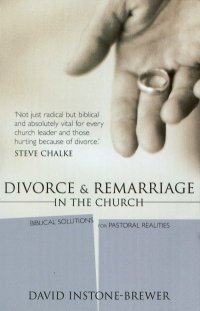

|
Questions & Replies about
Divorce and Remarriage | ||

|
Pastoral support doesn't really work by email, so if you need this, I'd encourage you to find a local fellow Christian or minister. Their personal views on this subject don't matter too much if they are good at listening, both to you and to God. David Instone-Brewer |

|
| Emailed question/comment: | ||
|
Our church's elders and pastors are engaged in a study of marriage, divorce, and remarriage. Our objective is a statement of position. Among the resources for our study are your two books -- Divorce and Remarriage in the Bible, and Divorce and Remarriage in the Church. We understand that you argue strongly that Jesus and Paul
accepted some cultural practices of the day (such as other grounds
of divorce and the expectation of remarriage) and that their silence
on these practices in the face of very relevant discussion in
Scripture (Gospels and Letters) indicates this acceptance. Some of
us are reluctant to put these apparent customs/practices on a par
with the explicit remarks in Scripture. For example, to some this
seems to be the kind of dubious logical reasoning that the Rabbis
built into "law" over the years. Can you comment? |
||
Reply: | ||
|
I wouldn't like to say that Jesus & Paul are in agreement with everything they are silent on, and therefore an argument from silence is VERY difficult. I am encouraged to use the argument from silence in this case because: 1) Jesus addresses so many issues concerning marriage & divorce (monogamy, divorce, singleness, forgiveness, compulsory divorce for adultery), even though he was only asked about one issue (the 'Any Cause' type of divorce), and in all of these he disagrees with a large proportion of the Jews. This suggests to me that he is taking the opportunity to list all the ways in which he disagrees with their doctrines in this area. 2) This is an issue where we don't find disagreement among different groups of Jews, which is relatively unusual. Admittedly we don't specifically know how some of those groups DID think, but the Schools of Hillel & Shammai and the early marriage certificates all indicate a uniform doctrine in this area. This would make it doubly likely that Jesus would address the issue if he disagreed with it. 3) This isn't just a Jewish custom, but an ethical principle in God's law as revealed to Moses. We continue to follow the ethical principles in Moses' law, even if we don't follow the ceremonial law. Our national laws are built on the foundation of OT ethics (eg we have different punishments for unpremeditated and premeditated murder - and many other egs, some in the book) and the NT continues to use the OT as a foundation for ethics. And this is right - the OT law is God's revelation of how to live. THe only areas where we shouldn't follow God's law in the OT is where it is part of a ceremonial system which Jesus outdated, or where it is a response or partial repeal of ancient Near Eastern laws and customs (eg "eye for eye"). |
||
Read more emails & replies... | ||
Version
-for ministers
-for academics
-for everyone
Summary
Reviews